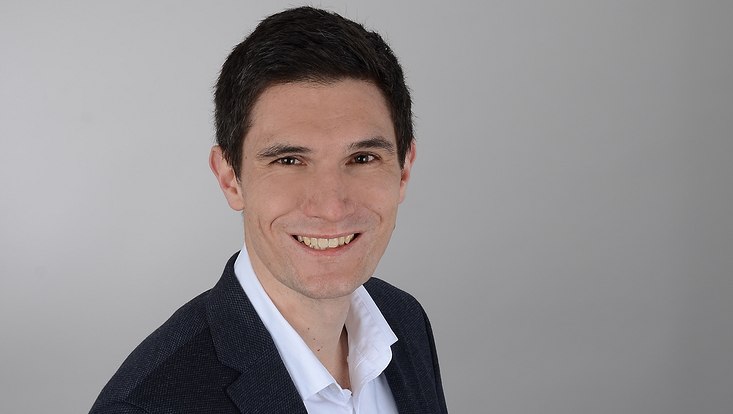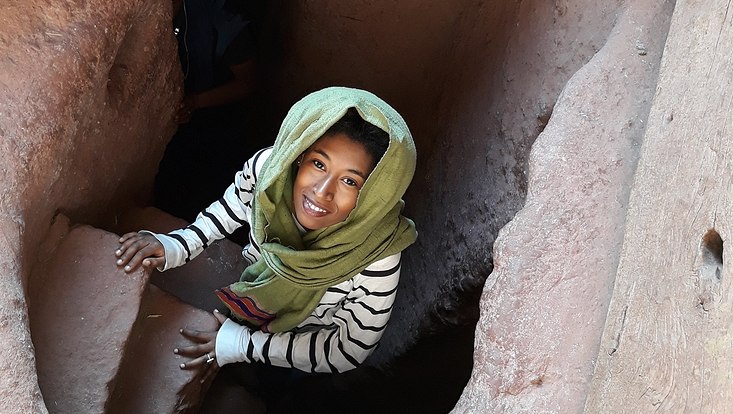“Welcome Aboard!”“Today’s religion—open, social-minded, empirical!”Prof. Dr. Felix Roleder strengthens the humanities.
3 July 2023, by Roleder/Red.

Photo: fotoprofi
Every year, Universität Hamburg welcomes numerous new researchers. This series introduces them and their areas of research. This time: Theologist Prof. Dr. Felix Roleder.
Prof. Dr. Felix Roleder joined the Faculty of Humanities on 1 July as a junior professor of Protestant theology with a focus on practical theology (cybernetics). He previously worked at the University of Tübingen.
My research area in 3 sentences:
For my postdoctoral thesis, I looked at (chronic) loneliness and social isolation as an empirical phenomenon and as a subject for pastoral and ecclesiastical care. I used a mixed-methods approach whereby I traced, using quantitative panel data, the diachronic course of individual and household’s lives and loneliness and combined these with qualitative research on practical fields of pastoral care, such as help hotlines. We see loneliness in its social dimension as social exclusion and as an individual situation related to biography, cognition, and coping mechanisms.
The professorship focuses on the study of current social forms of religion. I am as interested in institutionalized forms (church membership, leaving the church) as I am in changing forms of religion (digital religion, secularism). I do research on the public significance of religion, it’s positive and its ambivalent impact, for example, on the nature of social capital or political trust in our democratic institutions.
I explain what I do to my friends and family as follows:
Most of are familiar with passing feelings of loneliness. Some of us experienced loneliness with social distancing during the pandemic. We need to distinguish that from situations of chronic loneliness, which roughly 5 percent of the population experiences and is associated with psychological stress and health risks. I am interested in the extent to which religion plays a role in preventing and coping with loneliness. How can pastoral care and welfare beyond the individualization of loneliness also address the sociostructural and sociocultural causes as phenomena of social exclusion?
According to the French sociologist Émile Durkheim, religion is a social fact that can be subject to empirical research and that always continues evolving. The current popularity of religious influencers on social media is an example of new social forms of religiousness emerging in the wake of the transformation process of mediatization and that, at the same time, impacts established religious institutions in turn.
In Hamburg, the city and the University, I am looking forward to:
I look forward to teaching and research in the innovative and diverse environment of Universität Hamburg as well as the equally collegial and ambitious cooperation at the University, the Faculty of Humanities, and the Department of Protestant Theology. In addition to its many advantages, Hamburg excites me for its diverse religious and civic urban landscape and I would like to get to know it as an attractive place to live and research.
These are my plans at Universität Hamburg:
I would like to expand cooperation with the new Department of Religions and thus to strengthen our interreligious research and teaching profile in Hamburg and in the wake of the University’s profile initiative Thought and Religions. I also plan to introduce the topic of digital religion to the digitalization strategy in the Faculty of Humanities.
The challenge that loneliness poses to society is an opportunity for cooperation and knowledge exchange with society at large and local and pastoral and ecclesiastical partners in Hamburg—working on these is also in line with the University’s commitment to sustainability.
This is why students should come to my lectures:
Practical theology is a scholarly theory of religious and professional religious practice. In my classes, we work at the productive junction of theory and practice. One the one hand, we look at contemporary religious phenomena and apply these theologically. On the other, we take a critical look at theory and practice in religious professions because reflective (self-)perception and sound theological orientation are fundamentally important for professional religious careers.
When designing my courses, I value collaboration with the students, diverse methods, practical exercises, and independent research into fields of practice as well as theological reflection on impressions and experiences.
Reaching out to the world: I work with the following international and federal institutions and universities:
Most recently, I worked with colleagues in practical theology from all over the world at a bi-annual conference of the International Academy of Practical Theology in Seoul, South Korea on the topic of social loneliness as a global challenge, taking a comparative approach to cultures and societies. As part of my postdoctoral thesis project, I am planning to do a research stay in Great Britain (University of Sheffield, Centre for Loneliness Studies). In the future, I also want to get more involved in the International Journal of Practical Theology.
My research is important for society because:
Contrary to what some culturally pessimistic media are saying, our society is not facing a pandemic of loneliness. Nonetheless, there is a noticeably persistent part of the population dealing with chronic loneliness and that is concentrated in pastoral and welfare areas. With my research, I want to provide scholarly information to people suffering from loneliness and professional guidance.
Basically: despite functional differences, individualization, and a trend towards secularization, religion remains socially significant—as much as a societal challenge as a societal resource. I see it as an important and equally fascinating task to, first, address this adequately, and second, strengthen it. As a practical theologist, I make a contribution by enlightening current religious culture about its own nature.


